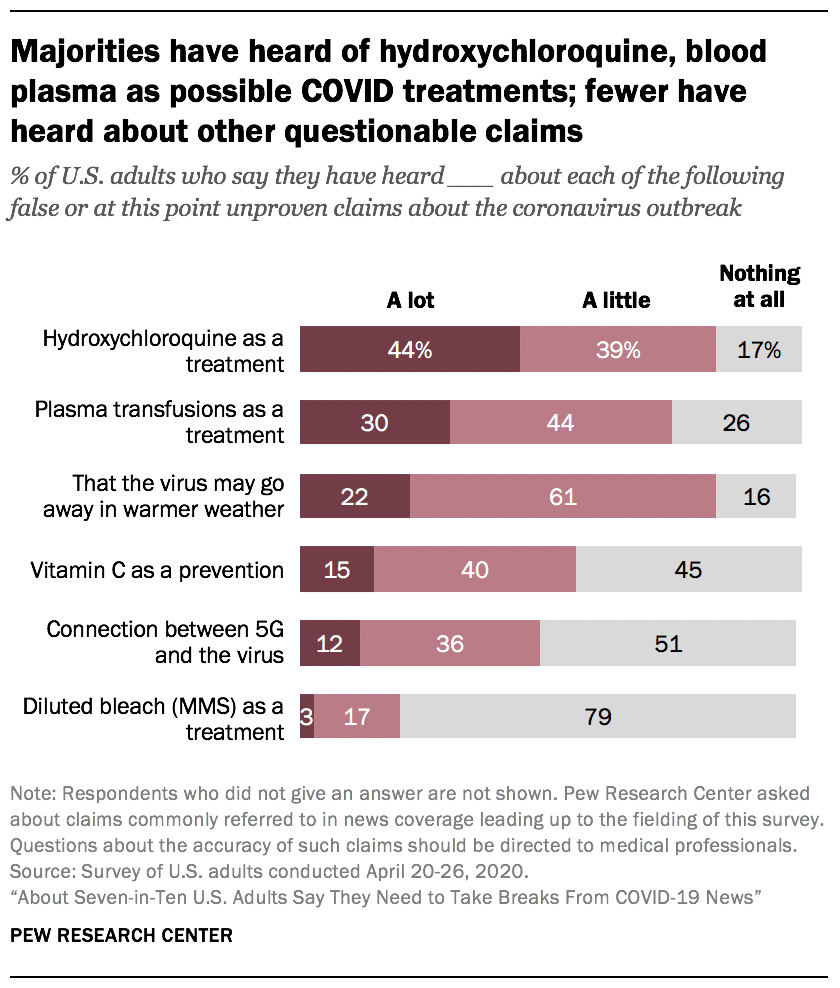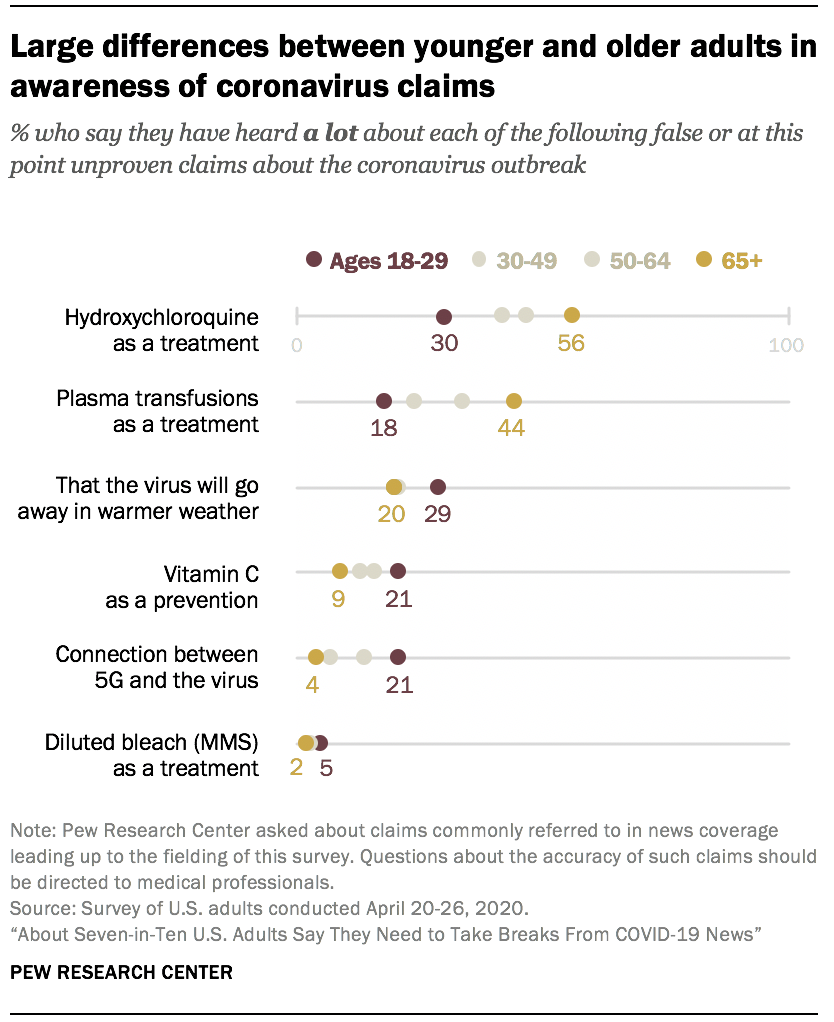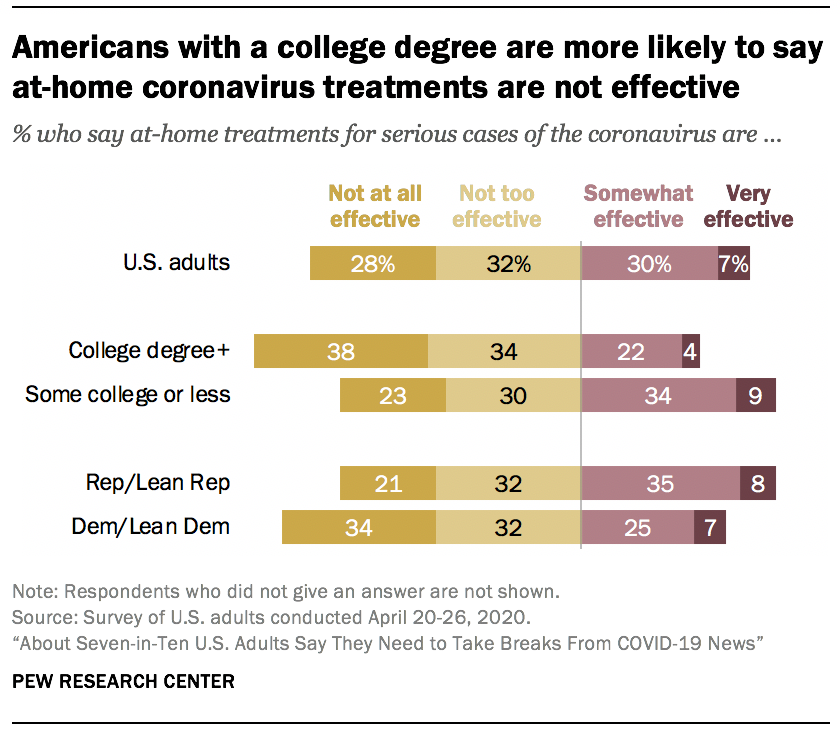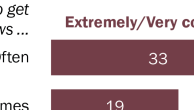Since the beginning of the coronavirus outbreak, a nearly continuous stream of information has flooded news headlines, personal conversations and social media feeds with possible causes, treatments and endings for the outbreak – some with more truth behind them than others. Fact checkers themselves have struggled to keep pace.
One way to gauge the impact of various coronavirus narratives is to see how many Americans have heard about them. This survey asked about several false or thus far unproven claims about possible causes, treatments and endings for the outbreak: treating the coronavirus using the medicine hydroxychloroquine, or blood plasma transfusions from recovered patients, or a potentially dangerous form of diluted bleach; taking vitamin C to prevent getting the virus; the possibility that the coronavirus may go away in warmer weather; and an alleged connection between 5G mobile phone technology and the coronavirus. (The majority of the survey was completed before Donald Trump’s comments about using disinfectants to treat the virus on April 23.)

More Americans have heard a lot about the anti-malaria drug hydroxychloroquine as a possible treatment for COVID-19 than about any of the other five claims. Slightly more than four-in-ten U.S. adults (44%) have heard a lot about the drug, which was touted by Trump and other prominent figures as a promising treatment (but has been linked with dangerous side effects). Another 39% have heard a little about this drug as a way to treat the coronavirus, while a minority (17%) have heard nothing.
Smaller shares of Americans have heard a lot about the remaining claims asked about.
Three-in-ten Americans have heard a lot about a new, but not fully tested, treatment that uses plasma transfusions from recovered patients for patients currently suffering from the virus. Fewer (22%) say they have heard a lot about the virus possibly going away in warmer weather, though about six-in-ten (61%) say they have heard a little about this potential development.
The public has heard less about claims that taking vitamin C prevents catching the coronavirus (15% have heard a lot) and about unsubstantiated concerns that there is a connection between 5G wireless technology and the coronavirus (12%). Very few people have heard a lot (3%) – or even a little (17%) – about a diluted form of bleach (sometimes known as “miracle mineral solution” or MMS) being touted by some on social media as protection against the virus.

There are large differences in how much the oldest adults – those ages 65 and older – and the youngest adults – those ages 18 to 29 – have heard about each of these items. (Adults in the two middle groups largely fall in between these two groups.)
Americans ages 65 and older have heard significantly more than those ages 18 to 29 about hydroxychloroquine and blood plasma transfusions as possible treatments for the coronavirus. Somewhat more than half of adults ages 65 and older (56%) say they have heard a lot about hydroxychloroquine, versus 30% of those ages 18 to 29. Similarly, 44% of adults 65 and older have heard a lot about plasma transfusions as a treatment, but just 18% of 18- to 29-year-olds say the same.
On the other hand, adults ages 18 to 29 were more likely than those 65 and older to say they’d heard a lot about the virus possibly going away in warmer weather (29% of ages 18 to 29 vs. 20% of ages 65+), the claim that vitamin C prevents the virus (21% vs. 9%) and unsubstantiated rumors of a connection between the outbreak and 5G technology (21% vs. 4%). There was no substantial age gap in how much the public reports hearing about the potentially dangerous treatment of taking a form of bleach to treat the virus.
These differences by age still hold even when looking at just those in each age group who say they are following news about the coronavirus outbreak very closely. For example, 66% of adults 65 and older who say they are following this news very closely have heard a lot about hydroxychloroquine as a potential treatment, compared with 53% of those 18 to 29 who say they are following coronavirus news very closely.
You can explore these survey questions by additional demographic groups, such as party identification, in the data tool.
Americans mostly skeptical of at-home treatments for COVID-19

A majority of Americans say “at-home treatments” for serious cases of the coronavirus are either not too effective (32%) or not at all effective (28%). Another 30% say at-home treatments are somewhat effective. Few (7%) say these treatments are very effective for serious cases.
Education connects to views of at-home treatments’ effectiveness. Americans who have a college degree broadly doubt these treatments can work: 38% say they are not at all effective, while an additional 34% say they are not too effective. Among Americans who do not have a college degree, about half say they are either not too (30%) or not at all effective (23%).
Republicans and Republican-leaning independents are somewhat more likely than Democrats and Democratic leaners to say at-home treatments for serious COVID-19 cases can be somewhat effective (35% vs. 25%). On the other hand, Democrats (34%) are more likely than Republicans (21%) to say they are not at all effective.
Those who are paying the closest attention to news about the outbreak – those following this news very closely – are the most likely to say at-home treatments are not at all effective.




